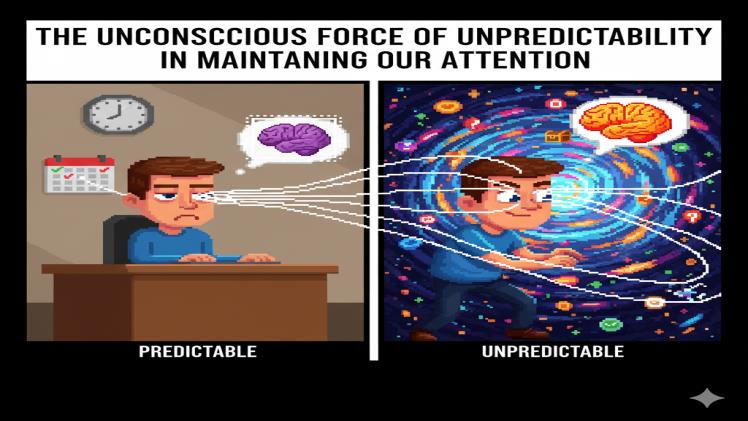When you ever felt like you needed to check your inbox one more time to receive that elusive response, get another notification on your phone every few minutes, or spin one more time in a game, then well done, you have encountered the most underestimated element to influence our digital lives, which is randomness.
It is very disorganized, disorganized, but randomness is among the most accurate methods for measuring human attention. It maintains the sense of guessing, hoping, anticipating—that anticipation is the honey pot of engagement. Unpredictability has crept into our dopamine loops since social media feeds into the bonus-bonus-bonus systems in apps like the National Casino Spain, and it is the invisible force tugging at them.
The Mystery of the Next Big Thing: The Sensation of Being Surprised.
People enjoy being in control, as if it is human nature. We make plans, schedule our days, and make lists. However, as soon as life becomes too predictable, one becomes bored. That is because our brains are not programmed to accept comfort in the routine; instead, they are programmed to accept the novel.
Where there is an uncertainty of results, we are on our guard. Every chance encounter is like a little adventure. This is what psychologists refer to as the variable-reward system, an idea based on traditional behavioural studies. When a person is rewarded each time they do a certain thing, they will soon grow bored. Give it at random, and you will have their attention forever.
This is the same concept as the modern internet — and yes, the periodic spin on your favourite game at National Casino Spain.
The Dopamine Loop: The Anticipation Feels so Good.
Without making you fall asleep, let’s talk neuroscience. The striatum and prefrontal cortex are deep within your brain, and interact to process reward anticipation. Dopamine, that well-known feel-good neurotransmitter, does not spike at the time you are rewarded. It also rises in advance when your brain tells you that a reward may be forthcoming.
Here, the dopamine loop starts:
- You are exposed to some random good thing (such as a bonus).
- Dopamine is released in your brain.
- You desire this feeling once more, but it is uncertain, and thus you continue practising the behaviour.
The loop is cleverly employed by apps, games, and even digital marketplaces. Why does it make you addicted to a notification ping, or why are you attracted to the mystery bonus in a casino VIP program? The brain equates uncertainty with potential gain, and that is a strong motivator.
Randomness goes digital: the evolution of Slot Machines to Social Feeds.
Slot machines had once been the kings of uncertainty. Now their digital heirs are everywhere: In your pocket, on your laptop, within your favourite apps.
- The scroll that is constant on Instagram?
- The loot box in a video game? Randomness. You might win big — or not at all.
- The miracle proposal of National Casino Spain? Also, chance, cleverly applied to maintain interest and reward loyalty.
This design philosophy, called variable-ratio reinforcement, is the most effective pattern for maintaining user attention. The uncertain timing and amount of the reward reduce the chances of you getting bored and quitting the game in the future, because each time you get to press a button, scroll, or spin, you wonder whether this time was the one rewarded by dopamine bursts.
The Case in Favour of Randomness vs. Routine.
To visualize this, we can have a simple framework:
It is as follows:
| Type of Reward System | Predictability | Example | Engagement Level | Psychological Effect |
| Fixed Ratio | High | Weekly paycheck, loyalty stamps | Moderate | Predictable satisfaction |
| Variable Ratio | Low | Slot spins, social media likes | Very High | Dopamine anticipation & curiosity |
| Variable Interval | Medium | Surprise discounts, random bonuses | High | Sustained attention |
| Hybrid (used by National Casino Spain) | Balanced | Casino VIP program rewards | Very High | Long-term retention |
Notice something? Predictability would lead to security, whereas unpredictability would lead to excitement. And that buzz—properly planned—can be a long-term engagement tool, not a temporary rush.
Even advanced systems such as casino VIP programs combine foreseeable advances (levels, points) with unforeseeable advances (mystery gifts, unexpected upgrading). The combination of these keeps the players emotionally engaged without leaving them feeling defeated or overshadowed, a psychological middle ground of consistency and shock.
The neuroscience of digital interaction.
Prediction models operate in our brains. This is because we always predict what will come next, whether it’s a message, a bonus, or a jackpot. In case reality defies that prediction, in case something unforeseen happens, a dopamine burst occurs, leading to an increase in focus.
That is why online platforms build arbitrary interaction devices. They make even simple actions little gambles:
- Will this post go viral?
- Will I get that upgrade today?
- Will this spin hit a bonus?
We stay in the loop of suspicion and payoff because of the suspense. Behavioural economists call this a cognitive bias toward variable rewards—a characteristic, rather than a defect, of human motivation.
Decision Fatigue and the Art of Fielding Randomness.
Now, randomness is another tool for overcoming decision fatigue, a mental burnout caused by making too many decisions. Occasionally, it is like a relief to be unaware of the result. It authorizes us to relinquish control and observe the course of events.
This is one of the reasons why individuals are attracted to features such as auto-spin or mystery boxes – they are deprived of the decision-making process while remaining at an emotional level. The brain slacks off but remains stimulated. It’s the contradictory comfort of anarchy.
This principle is beautifully played out on platforms such as National Casino Spain, which feature organized systems with surprise elements. An equilibrium between planning and improvisation that keeps users down-to-earth and excited.
Professional Wisdom: The Invisible Hand of Retention.
Humans are addicted not to rewards, as behavioural scientists put it, but to possibilities. It is the possibility engine, driven by randomness. It turns humdrum interactions into emotional ones and regular platforms into stimulating ecosystems.
Random is not manipulation, as it is used ethically. It fills our interest, pushes our reward programs, and makes the digital world vibrant and exciting. In neuroscience laboratories, as in virtual entertainment applications such as National Casino Spain, the unpredictable always captures our interest.






